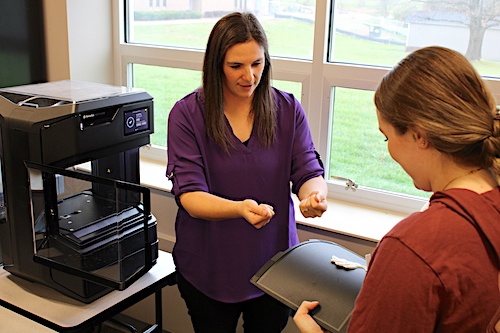
~ Press release issued by Lord Fairfax Community College
With the creation of an associate of science degree in engineering in fall 2021, LFCC students planning to transfer into engineering programs at Virginia Tech and other four-year universities will have much clearer pathways to do so. Previously, aspiring engineers would graduate with an associate of science degree in science with a specialization in engineering.
The new engineering transfer degree provides clarity to both students and the institutions into which they will transfer.
“Having a specific engineering degree makes it very clear to the four-years exactly what the student wants to do,” said Engineering Professor Elizabeth “Liz” Palffy. “The students who are coming into our engineering program, they’re some of the brightest that I’ve seen. They become much better students and engineers by getting their associate degree before going to a four-year.”
In their first year, engineering students take foundational classes. It is during this time that students can really discern which discipline area within engineering they’d like to focus on. There are many to choose from, including civil, mechanical, chemical, aerospace, electrical, computer and biomedical.
In their second year, students choose electives based on their selected discipline. For example, those wishing to become aerospace, civil or mechanical engineers would study statics and strength of materials, while those eying electrical engineering would take circuits and computer programming classes, those interested in biomedical engineering would take biology, and prospective chemical engineers would enroll in organic chemistry.
Earning an engineering degree comes with a fairly heavy course load; students can expect to take 16-19 credit hours per semester. Before graduating with an associate degree in engineering, students will have taken five math classes.
“They will use everything they’ve learned here when they transfer into their junior and senior-level classes,” Professor Palffy said.
This summer, LFCC is offering the chance for rising high school juniors and seniors to explore engineering through FREE 3D Design and Robotics Camps. In addition to using Arduino microcontrollers to create and operate robotics and building a 3D design-and-print project, attendees will get to meet current engineering students. Learn more at LaurelRidge.edu/EngCamp, or email Engineering Professor Alex Peebles at apeebles@laurelridge.edu, or Professor Palffy atepalffy@laurelridge.edu.
One of the biggest advantages to starting an engineering degree at LFCC is the small class sizes.
“Our foundations of engineering classes are capped at 24 students,” Professor Palffy pointed out, adding that the same classes at four-year universities can have more than 500 students each. “Our students are really getting a lot more individualized learning and attention. That really helps students determine what engineering discipline they want to do. It’s just much more individualized and it helps them explore and figure things out in a more supportive, inclusive and creative environment.”
Professor Palffy added another very important bonus of coming to LFCC for the first two years of an engineering degree – significant cost savings. With 80-90 percent of the engineering students planning to transfer to Virginia Tech after graduation, camaraderie is strong among the group, she noted.
The salary expectations for new graduates vary depending on the engineering discipline they choose. This can range from about $55,000 to $120,000, according to Professor Palffy. Likewise, the workplaces engineering graduates end up will also vary. Some may work for NASA, some for software companies, some for contractors.
“Engineers are always in demand,” Professor Palffy said. “You will find a job in engineering. Local, regional, and global firms are always hiring engineers.”
Learn more about LFCC’s engineering program and salary expectations at lfcc.edu/engineering.
•••
RELATED ARTICLES
LFCC piloting unmanned aircraft systems (drones) courses this fall
LFCC chosen for U.S. Cyber Command’s Academic Engagement Network
LFCC students now have immediate access to free mental health support and counseling



So excited about the engineering program. What age can students start?
My grandson is 14 years old and wants to be an engineer. He wants to be a baseball players but to also have a back up career as a engineer. Designing is what he focusing on right now.